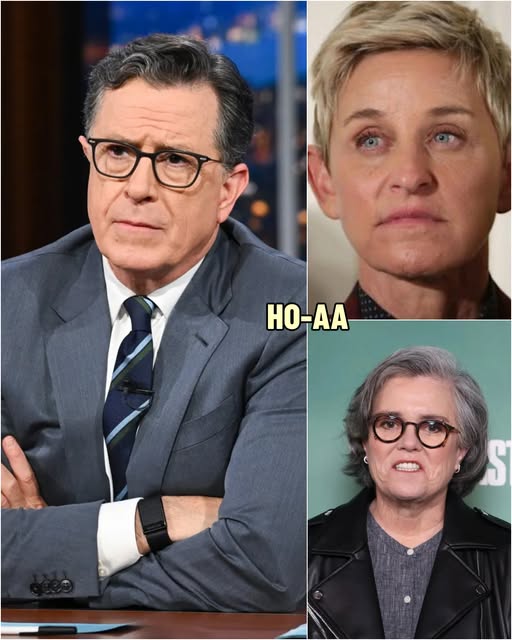Stephen Colbert said he understands why Rosie O’Donnell and Ellen DeGeneres left the United States. He’s considering doing the same after being fired.
Stephen Colbert said he understands why Rosie O’Donnell and Ellen DeGeneres left the United States. He’s considering doing the same after being fired. | HO~

In a candid and emotional interview this week, late-night television icon Stephen Colbert revealed that he is seriously considering leaving the United States after his abrupt firing from CBS. Colbert, whose razor-sharp wit and political satire have defined “The Late Show with Stephen Colbert” for nearly a decade, told reporters, “Now I understand why Rosie O’Donnell and Ellen DeGeneres left. Sometimes, you just have to get out.”
Colbert’s comments have sent shockwaves through the entertainment industry, reigniting conversations about the pressures faced by outspoken celebrities in the current political and media climate. This investigation delves into the circumstances surrounding Colbert’s firing, the parallels with O’Donnell and DeGeneres, and the broader implications for free speech and dissent in American media.
The Sudden Fall
On July 24, 2025, CBS announced that Colbert would be leaving “The Late Show,” effective immediately. The network cited “creative differences” and a “desire to move in a new direction.” However, sources inside CBS, speaking on condition of anonymity, describe a tense environment in the months leading up to Colbert’s departure.
“He was under constant scrutiny,” said one producer. “Every monologue, every joke was being dissected by the higher-ups. It felt like they were looking for an excuse.”
Colbert’s firing comes on the heels of several controversial segments in which he criticized both major political parties, the Supreme Court, and the rising influence of corporate money in politics. According to colleagues, the tipping point may have been a segment aired on July 18, in which Colbert lampooned a new law restricting protest rights in several states.

“It’s Not Just About Me”
In his interview, Colbert drew direct comparisons to Rosie O’Donnell and Ellen DeGeneres, both of whom left the U.S. in the past decade after facing intense media backlash and professional setbacks.
“Rosie and Ellen, they saw the writing on the wall,” Colbert said. “When you’re outspoken, when you challenge power, there’s a price. I used to think I could handle it, but now I see why they left.”
O’Donnell, who moved to Canada in 2018 after a series of public clashes with network executives and politicians, has spoken openly about the mental toll of being a high-profile critic of the establishment. DeGeneres, who relocated to Australia in 2022, cited “a toxic environment for dissent” as a key factor in her decision.
Colbert’s remarks suggest a growing sense of alienation among media figures who once felt protected by their celebrity status and the tradition of free speech in American entertainment.
The Chilling Effect
Media analysts warn that Colbert’s firing and his subsequent comments may signal a dangerous trend. “This is a chilling moment for late-night TV and for political comedy in general,” says Dr. Laura Mendes, a professor of media studies at NYU. “When the most prominent satirists are sidelined or driven out, it sends a message to everyone else: Tread carefully, or you’ll be next.”
According to Mendes, the pressures come not only from network executives but also from advertisers and political interest groups. “There’s an increasing intolerance for criticism, especially when it’s aimed at powerful institutions,” she says. “It’s not just about ratings anymore. It’s about control.”

Behind the Scenes: The Cost of Dissent
Former staffers describe a workplace transformed by fear and uncertainty. “We used to joke that if you weren’t making someone angry, you weren’t doing your job,” said a former writer for “The Late Show.” “But in the last year, the jokes started getting cut. We were told to ‘tone it down’ or ‘focus on lighter topics.’ It was clear the network was nervous.”
Colbert himself acknowledged the personal toll. “I’ve lost friends. I’ve lost sleep. And now I’ve lost my platform,” he said. “But I refuse to lose my voice.”
He emphasized that his decision to consider leaving the U.S. is not just about personal safety or career prospects, but about a deeper sense of disillusionment. “I love this country. I want to believe in it. But when speaking the truth becomes a liability, you have to ask yourself: What am I staying for?”
Industry Reaction
The entertainment community has responded with a mix of outrage and resignation. Comedian Samantha Bee tweeted, “If Colbert is too much for CBS, what hope is there for the rest of us?” Jimmy Kimmel called the firing “a dark day for comedy and for democracy.”
Meanwhile, CBS has maintained that the decision was “purely professional,” insisting that the network “remains committed to diverse viewpoints.” But critics are unconvinced. “This is about silencing dissent,” said activist and filmmaker Ava DuVernay. “It’s about making sure that only certain voices are heard.”

What’s Next for Colbert?
Colbert says he has not made a final decision about leaving the country, but he is exploring options. “I’m talking to friends in Canada, in New Zealand, in Ireland,” he said. “I need to find a place where I can speak freely, where I can do my work without fear.”
He also hinted at the possibility of an independent media project, free from network constraints. “The internet is still out there. Maybe it’s time to build something new.”
Whatever Colbert decides, his departure from “The Late Show” marks the end of an era—and raises urgent questions about the future of satire, dissent, and free expression in America.
As Colbert himself put it, “If the only people allowed to speak are the ones who say nothing, then we’re all in trouble.”
